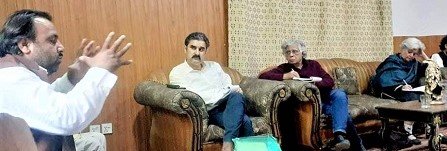HRCP concludes five-day-long fact-finding mission to Gilgit-Baltistan, finds deterioration in human rights situation
HAH Special Correspondent
GILGIT, June 8: The Human Rights Commission of Pakistan (HRCP) has concluded a high-profile fact-finding mission to Gilgit-Baltistan (GB) calling for an end to constitutional, political and economic deprivation in the region.

Suicide incidents
“The mission is especially alarmed by the apparent surge in suicide cases in various parts of GB, particularly in district Ghizer. A large number of these victims comprise women and the mission has reason to believe that some cases of honour killings have been labelled suicide and thus ‘forgotten’.”
Human rights situation
Comprised of HRCP council members Salima Hashmi, Muzaffar Hussain, senior journalist Ghazi Salahuddin, and HRCP regional coordinator Israruddin, the team during its five-day visit met several political leaders and civil society activists, including Awami Workers Party Chairman Baba Jan, Akhun Bai, Asif Sakhi, Zahoor Lahi, Akhtar Amin, Ikram Jamal, Aminullah, Nasir and PTI’s Aziz Ahmed, Bolor Research Forum representatives, Sultan Madad and Engineer Amanullah and others.
The mission found that the human rights situation in the region had deteriorated, with political workers, rights activists, the legal fraternity and religious leadership expressing their disappointment at the federation’s failure to integrate GB with the rest of the country.
Constitutional status
The groups that the mission consulted were of the view that GB should, at the very least, be granted provisional provincial status or, as the last option, granted a governance system similar to that of Azad Jammu and Kashmir.
The political leadership that met the mission also demanded that GB be made part of the electoral reform process being undertaken to ensure free and fair elections in this region.
Judiciary
In addition, the fact that appointments to the higher judiciary are made by the prime minister puts a question mark over the independence, integrity and impartiality of the GB judiciary, eroding public confidence in the institution.
Freedom of expression
It is a matter of great concern that freedom of expression and peaceful assembly remain under threat in GB. Rights campaigners, political workers and students continue to be charged under anti-terrorism and cybercrime laws, particularly Schedule IV of the Anti-Terrorism Act.
Resource and land grabbing
Based on the evidence, the mission believes that the abolition of the State Subject Rule has paved the way for the exploitation of local natural resources by non-local private corporations and individuals. This has led to demographic changes in the region, to the consternation of residents, who also feel that GB is being excluded from development projects, primarily those being launched under CPEC.
Climate change and disaster
The mission is gravely concerned to learn that the victims of the 2010 Attabad Lake disaster have still not been compensated or rehabilitated.
The glacial lake outburst floods that occurred recently on the Shisper glacier have also uprooted over a dozen families with worrying allegations that a state-owned organization may have diverted the flow of water towards the village to protect a resort.
Kargil war affectees
During meetings with people affected by the Kargil War, the mission learnt that they had still not been compensated for the loss of their homes and livelihoods.
Respondents alleged that the civilian and military authorities continued to shift responsibility onto each other for the redressal of their grievances. The victims also claimed that security forces had laid landmines in their area, preventing them from returning home.
A detailed report documenting the mission’s findings and recommendations will be released later.

The High Asia Herald is a member of High Asia Media Group — a window to High Asia and Central Asia






